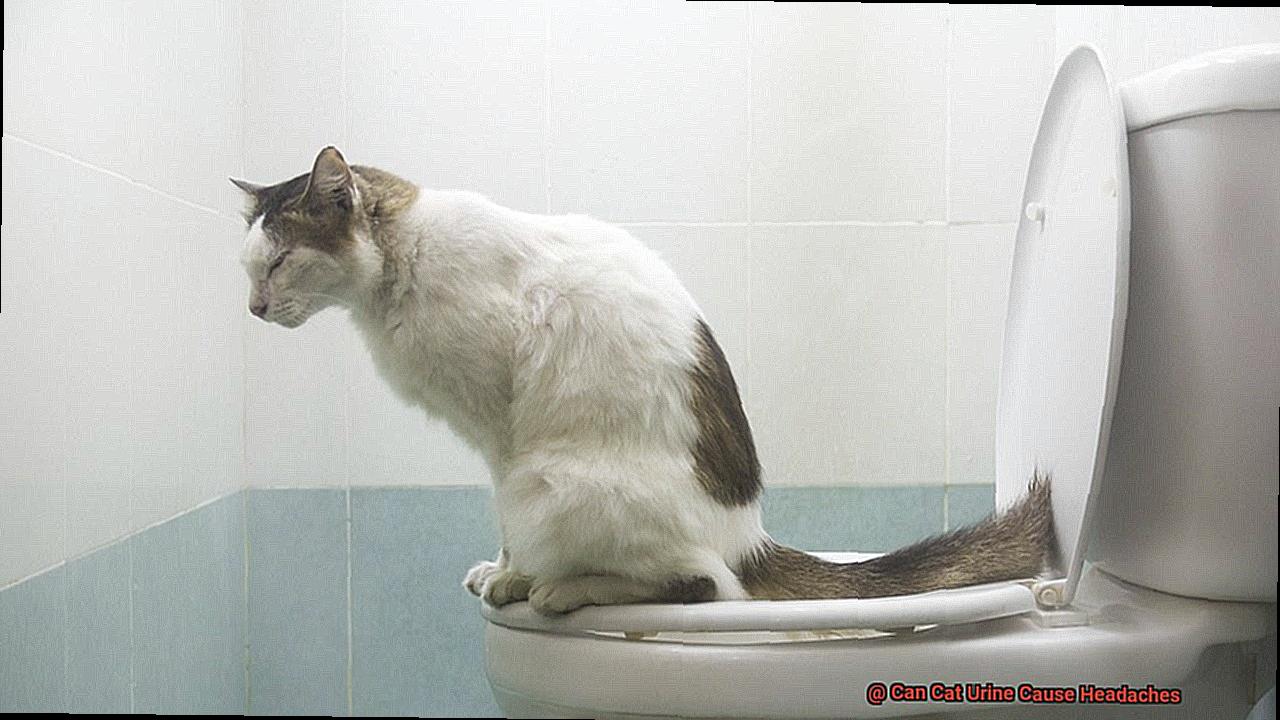As a cat lover or owner, you’re probably well aware of the overwhelming and pungent smell of cat urine. It’s a scent that can linger in your home and leave you with a headache or even a mild sense of nausea. But did you know that the smell of cat urine can actually cause headaches directly? That’s right – those cute and cuddly felines may be causing more harm than good.
Numerous scientific studies have suggested that inhaling volatile compounds found in cat urine can cause headaches, dizziness, and nausea in humans. These compounds make the odor of cat urine unbearable for some people, especially those who are sensitive to strong smells.
So what does this mean for you as a cat owner? Well, it means that if you’re experiencing headaches or other health issues related to the smell of your furry friend’s urine, there are ways to prevent them. From keeping your litter box clean to using odor-neutralizing products, there are plenty of options available.
But why exactly does cat urine have such a potent effect on our health? The answer lies in the chemical makeup of the compounds found in their urine. In this blog post, we’ll explore these compounds and how they affect our bodies.

Whether you’re a seasoned cat owner or simply interested in learning more about how smells impact our health, this post is for you. So sit back, relax, and read on to discover everything you need to know about whether or not cat urine can cause headaches.
What is Cat Urine?
This liquid waste product is a complex mixture of various substances, including water, urea, uric acid, creatinine, electrolytes, and other organic and inorganic compounds. But what makes cat urine stand out from other pet waste? The answer lies in uric acid – a component that gives it its distinct odor.
When uric acid is exposed to air, it breaks down into ammonia – a compound that can irritate the eyes and respiratory system. This explains why some people may experience headaches or other symptoms when exposed to the smell of cat urine. But fear not. With proper litter box maintenance and ventilation, you can keep your home odor-free and reduce the risk of any health problems.
In addition to its unique odor properties, the pH level of cat urine can also vary depending on the cat’s diet and health. Most cats have a slightly acidic urine pH ranging from 5.5-6.However, an abnormally high or low pH level can indicate underlying health issues such as urinary tract infections or kidney disease.
Understanding the composition and behavior of cat urine is crucial for pet owners. Regularly cleaning your cat’s litter box with a high-quality litter that absorbs odors can help reduce exposure to ammonia and minimize the odor.

Keeping your home well-ventilated with open windows and fans can also help remove any lingering smells and reduce the risk of headaches or other symptoms.
What Causes Headaches From Cat Urine?
If you’re familiar with the distinctive smell of cat urine, then you know that it can be a potent trigger for headaches, particularly for folks who are sensitive to odors.
But there’s more to it than just the smell. Cat urine contains ammonia, which is a powerful irritant that can lead to respiratory issues and headaches when inhaled. If your feline friend has a habit of using one specific spot as its designated bathroom, the concentration of ammonia in the air can become so high that it leads to persistent headaches.

Allergies are another possible culprit when it comes to headaches caused by cat urine. Some people are allergic to cat urine, and exposure to it can trigger a range of symptoms, including headaches.
If you suspect that you may have an allergy, it’s important to speak with your doctor and get tested, so you can take appropriate measures to minimize your exposure.
In addition to the smell and ammonia content, constantly cleaning up after your cat could also be contributing to your headaches. The physical exertion of bending over and scrubbing can lead to tension headaches caused by muscle tension in the head and neck. Repetitive motions like cleaning up after your furry friend could exacerbate this type of headache.
If you’re experiencing persistent headaches or other symptoms related to exposure to cat urine, it’s essential that you take steps to minimize your risk.
Proper litter box maintenance and ventilation are key factors in keeping your home odor-free and reducing any health risks associated with cat urine. If you’re still experiencing headaches despite these measures, it’s important to speak with your doctor for further evaluation and treatment options.
So, there you have it – several potential causes of headaches from cat urine. As a responsible pet owner, it’s crucial that you prioritize both your pet’s wellbeing and your own health.
Who Is Most Susceptible to Developing Headaches From Cat Urine?
Various studies have shown that people who are allergic to cats are most susceptible to developing headaches from cat urine. Allergies occur when the immune system overreacts to a substance, such as cat dander or urine. This triggers the body to release histamine, which can cause symptoms such as sneezing, itching, and headaches.
But that’s not all. People with asthma are also at risk of experiencing headaches from cat urine. Asthma is a chronic lung disease that causes inflammation and narrowing of the airways. Exposure to cat urine can trigger an asthma attack, which can lead to headaches as a symptom.
However, it’s important to note that not everyone who is allergic to cats or has asthma will necessarily develop headaches from cat urine. The severity of the allergy or asthma, as well as the frequency and amount of exposure to cat urine, can also play a role in whether or not someone experiences headaches.
Children and elderly individuals may also be more susceptible to developing headaches from cat urine because their immune systems may not be as strong as those of healthy adults. Pregnant women should also take precautions when dealing with cat urine as exposure can potentially harm the fetus.
If you’re one of the unfortunate ones who experiences headaches from cat urine, don’t suffer in silence. Seek medical advice and take steps to minimize your exposure.
Your doctor may recommend allergy medication or other treatments to help manage your symptoms. It’s also important to keep cats out of certain areas or use a high-quality air purifier.
How Can You Reduce Your Exposure to Cat Urine?
Exposure to cat urine can cause headaches and other health problems, but you can minimize your risk by following some simple steps.
Firstly, keeping your cat’s litter box clean and odor-free is crucial. By regularly scooping and replacing the litter, as well as cleaning the litter box with hot water and mild detergent at least once a week, you can prevent exposure to cat urine. Using a litter box with a lid or placing it in a well-ventilated area can also help reduce exposure.
Moreover, regularly cleaning and sanitizing any surfaces or areas where your cat may have urinated is essential. Enzymatic cleaners specifically designed for pet urine are highly effective in removing traces of cat urine from carpets, furniture, and bedding. This will help eliminate any lingering odors and prevent any potential health risks.

Investing in an air purifier with HEPA filters can also be beneficial in reducing exposure to cat urine. HEPA filters effectively capture pet dander, dust, and other allergens that may cause headaches or other health issues.
Lastly, if you or someone in your household is particularly sensitive to cat urine, consider limiting contact with the cat or seeking medical advice on how to manage any symptoms. Prioritizing your health is always important.
Taking these steps can help protect your health and reduce exposure to cat urine. By keeping your cat’s litter box clean, sanitizing any affected surfaces and investing in an air purifier with HEPA filters, you can breathe easy knowing that you’re minimizing your risk of exposure to cat urine.
Cleaning the Litter Box Regularly
Not only does it keep your home smelling fresh, but it also helps prevent the spread of harmful bacteria and parasites that can affect both you and your beloved feline friend.
Did you know that cat urine contains urea, which turns into ammonia when exposed to air? This potent gas can cause a lot of problems, such as headaches and respiratory issues, for both you and your furry companion. That’s why it’s essential to clean the litter box frequently to prevent any buildup of ammonia.
To ensure your litter box is always in tip-top condition, scoop out solid waste daily, and replace the litter entirely at least once a week. Don’t forget to wash the litter box with soap and water every few weeks to eliminate any lingering bacteria or odors.

Choosing a high-quality litter that’s designed to absorb moisture and odors is another excellent way to reduce the impact of cat urine on your health. Not only does it help minimize the amount of ammonia released into the air, but it also makes cleaning up after your cat more manageable.
If you’re still worried about airborne particles, consider placing an air purifier in the room where the litter box is located. This nifty device can filter out any unwanted particles that may cause respiratory issues or irritations.
Maintaining a clean litter box is critical for both your cat’s well-being and your own. By taking preventative measures like regular cleaning and using high-quality litter, you can ensure that your home remains odor-free and healthy for everyone living in it.
Using a High-Quality Litter That Absorbs Odors
When it comes to preventing cat urine from causing headaches, choosing a high-quality litter that absorbs odors is the perfect solution.
When a cat urinates, the liquid evaporates, leaving behind crystals that can emit a rather unpleasant odor. However, choosing the best litter can help eliminate this problem. There are various types of litter available, including clay, silica gel, and natural materials such as corn or wheat. Each type has its own advantages and disadvantages, so it’s crucial to select the one that suits you and your furry friend the most.
Clay litters are the most commonly used type of litter and are known for their excellent absorbency. However, they can be dusty and may not be environmentally friendly. Silica gel litters are made from tiny beads that absorb urine and odors but can be expensive and may not be as effective as other types of litter. On the other hand, natural litters made from corn or wheat are biodegradable and often have good odor control properties but may not be as absorbent as clay or silica gel litters.
Regardless of the type of litter you choose, it’s essential to change it frequently to prevent odors from building up. Most experts recommend changing the litter at least once a week, although some cat owners prefer to do so more frequently. Additionally, cleaning the litter box regularly with mild soap and water is also vital in preventing bacteria growth.
Keeping Your Home Well-Ventilated
Ammonia, a common component in cat pee, can be harmful if inhaled for extended periods. Luckily, there are simple steps you can take to keep your home well-ventilated and improve the air quality.
First and foremost, open windows and doors whenever possible to allow fresh air to circulate throughout your home. This will help remove any stale or polluted air from inside. You can also use fans or air purifiers to enhance the air quality inside your home. Air purifiers work wonders in removing pet odors and other pollutants from the air.
To take natural ventilation a step further, try using natural sources of airflow like wind and temperature differences to circulate air in your home. Strategically placing windows and vents throughout your living quarters can help you take advantage of these natural airflow patterns.
Another crucial component of keeping your home well-ventilated is maintaining your HVAC system. A poorly maintained HVAC system can lead to poor indoor air quality, which can make headaches caused by cat urine worse. Make sure to change your air filters regularly and have your system inspected and serviced by a professional at least once a year.
In addition to these steps, it’s important to keep your litter box clean and use a litter that absorbs odors effectively. By following these simple tips, you can ensure that your home is well-ventilated and free from harmful pollutants like ammonia.
Proper ventilation is essential when it comes to preventing headaches caused by cat urine. By using natural ventilation techniques, fans or air purifiers, and maintaining your HVAC system, you can improve the overall air quality in your home and reduce the risk of health problems caused by cat urine.
e67VlPfIPnU” >
Other Tips for Reducing Your Exposure to Cat Urine
However, if you’re suffering from headaches or other health issues due to exposure to cat urine, it can be a cause for concern. But don’t worry, there are several simple steps you can take to reduce your exposure and protect your health.
Here are some tips for minimizing your risk of developing headaches or other health issues related to cat urine:
Keep the litter box clean
A clean litter box is crucial for reducing the amount of ammonia in the air. Regularly scooping the litter box, changing the litter, and cleaning the box with soap and water can help keep your home smelling fresh and prevent headaches.
Use an air purifier
If your cat spends a lot of time indoors, consider investing in an air purifier with a HEPA filter. This can help remove allergens and irritants from the air, including those associated with cat urine.
Use natural cleaning products
Traditional cleaning products can contain harsh chemicals that may cause headaches or other health issues. Opting for natural alternatives like vinegar, baking soda, or lemon juice can be a safer and healthier option.
Clean carpets and upholstery promptly
If your cat has soiled your carpet or furniture, it’s important to clean it promptly to prevent the urine from drying out and becoming more difficult to remove. There are many commercial cleaners available that are specifically designed to tackle cat urine stains and odors.
Use a vacuum cleaner with a HEPA filter
A vacuum cleaner with a HEPA filter can help remove pet hair, dander, and other allergens from your home, reducing your risk of developing headaches or other allergic reactions.
By following these tips, you can minimize your exposure to cat urine and protect your health while still enjoying all the benefits of owning a cat.
However, if you continue to experience headaches or other symptoms related to exposure to cat urine, it may be worth consulting with an allergist or medical professional for further advice and treatment options.
Also Read: Why Does My Sweat Smell Like Cat Pee?
Conclusion
In conclusion, the answer to the question of whether cat urine can cause headaches is a resounding yes. As much as we love our feline friends, their urine contains volatile compounds that can trigger headaches, dizziness, and nausea in humans – especially those with a sensitivity to strong smells.
Luckily, there are several ways to prevent these unpleasant symptoms. One of the most important steps is to keep your litter box clean and use odor-neutralizing products. Proper ventilation is also crucial – opening windows and doors or using air purifiers with HEPA filters can help reduce your exposure to harmful chemicals.
It’s worth noting that certain individuals are more susceptible to developing headaches from cat urine. People who have asthma or allergies may be at higher risk of experiencing adverse reactions due to exposure.
To further minimize your exposure to cat urine, consider using natural cleaning products and promptly cleaning carpets and upholstery if they become soiled. Additionally, using a vacuum cleaner with a HEPA filter can help eliminate pet hair, dander, and other allergens from your home.
In summary, taking proactive measures like regular cleaning and using high-quality litter can significantly reduce the impact of cat urine on your health.







